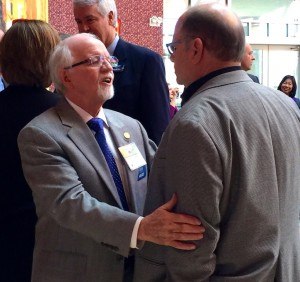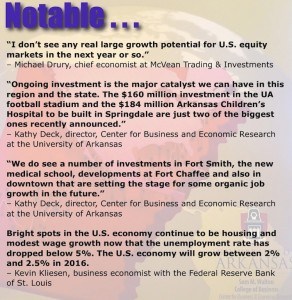Experts predict modest growth in 2016 for U.S, state, metro economies
by January 29, 2016 6:00 pm 230 views

Global economic growth is slowing with China struggling and Europe coming off a two-year recession. The U.S. fourth quarter GDP grew at a disappointing 0.7%, but economists at the University of Arkansas’ annual forecast luncheon say 2016 will be a growth for the nation and most of Arkansas regions.
The state of the world, national and local economies were discussed Friday (Jan. 29) before nearly 1,000 business professionals at the annual event held in Rogers and coordinated by the university’s Sam M. Walton College of Business.
Kevin Kliesen, business economist with the Federal Reserve Bank of St. Louis, said real GDP growth across the nation has slowed dramatically compared to the past three periods of business expansions. In this last cycle of economic expansion, which began in 2009, the annualized rate of GDP growth has been 2.4%, down from 2.8% between 2001 and 2007 and nearly half of the 4.4% GDP growth rate between 1982 and 1990.
He said the biggest component of the GDP – hours worked and labor productivity –continue to shrink. Event moderator Bill Dillard III, CEO of Little Rock-based Dillard’s Inc., said he sees a fundamental economic shift from one that is supply fueling demand to one that is demand now trying to dictate supply. He said in 1964, AT&T was the nation’s biggest company with market capitalization value of $267 billion in today’s dollars. They employed 758,000. Today, he said Google has a market cap of $480 billion with a workforce of just 55,000 and Facebook is worth $300 million employing just 12,000.
“Just let that sink in for a minute,” Dillard said as he questioned whether the world‘s ability to supply could exceed demand. “These are unprecedented times in which we live.”
Bright spots in the U.S. economy continue to be housing and modest wage growth now that the unemployment rate has dropped below 5%, Kliesen said. He expects inflation to be low given the sustained decline in oil prices. He said that could reverse if oil prices stabilize and trend upward.

Kliesen expects the U.S. economy will grow between 2% and 2.5% in 2016, but there are risks on either side based on oil prices. Job gains are expected to continue to outpace labor force growth, thereby reducing the overall unemployment rate. He said oil prices and the dollar are the two wildcards in his forecast.
WAGE GROWTH EXPECTED
Kathy Deck, director for the Center for Business and Economic Research at the UA, said Arkansas has reached its “cruising altitude” but there will be some turbulence in 2016.
One of the brightest spots in Deck’s presentation was the rise that is finally occurring in per capita income levels across the state, and particularly in Northwest Arkansas. The average per capita income in Benton and Washington counties is $50,000, which is roughly $5,000 more than the $40,000 national rate. Deck said the state still lags the nation at about $38,000, but the trend has been rising since 2014.
Michael Drury, chief economist at McVean Trading & Investments, said while much of the world is slowing, the national economy, now in its seventh year of expansion has reached its “sweet spot” for wage growth amid lower unemployment numbers. Drury said the time has come when companies have to start sharing improved profits with their workforces if they want to keep them. He said during times of full-employment, more people will change jobs because they are incentivized to do so, often by competing organizations.

“I don’t see any real large growth potential for U.S. equity markets in the next year or so,” he said.
NORTHWEST ARKANSAS ECONOMY
Deck expects Northwest Arkansas will add 5,700 new jobs in 2016. She said the region’s growth should continue behind heavy investments being made top to bottom across the two-county area.
“Ongoing investment is the major catalyst we can have in this region and the state. The $160 million investment in the UA football stadium and the $184 million Arkansas Children’s Hospital to be built in Springdale are just two of the biggest ones recently announced,” Deck said.
The Northwest Arkansas economy is $20 billion in size and big enough to handle some of the turbulence Deck expects in 2016. Deck said while construction is strong around state, it is not leading employment growth, which is a more sustainable situation than before the recession.
The tourism and hospitality employment sector is the fastest growing segment of the Northwest Arkansas economy. Just five years ago the region didn’t have Crystal Bridges Museum of American Art, the Scott Family Amazeum, the Walmart AMP or the Razorback Greenway. All which have fostered visitor travel and growth in the hospitality and tourism employment sector, Deck said. She said much of the work happening in downtown Springdale, Fayetteville, Rogers and Bentonville is centered around quality of life improvements that also fuel the hospitality sector.
John James, founder of Acumen Brands, has now turned to helping small companies raise needed capital for expansion. James told Talk Business & Politics at the event that his firm Hayseed Ventures, knows of at least 50 new jobs that have been created in the entrepreneurial areas of Northwest Arkansas in the past year. He said the company continues to work with out-of-state venture funds to help find capital for the state’s budding entrepreneurial sector.
Deck said the entrepreneurial sector is important to the ongoing employment growth in the region and state.
CENTRAL ARKANSAS AND JONESBORO
As the most populated region in the state, Deck said the Little Rock metro area has been moving full-steam ahead in terms of job growth since early 2015. Central Arkansas employment finally rebounded in 2015 to its precession levels (350,000 jobs) and it continues to grow, rising to 355,000 by the end of 2015.
Deck expects the Little Rock metro economy to continue its upward trend. She said there will be turbulence there as jobs related to the energy sector will likely continue to be purged.
She also said the Jonesboro metro is doing well. She said ongoing investments there from private to public projects help keep the region’s momentum moving along.
FORT SMITH METRO
Fort Smith continues to struggle in terms of employment. Deck said there hasn’t been a marked recovery there since the recession and the closing of Whirlpool. She said the labor force numbers have stayed pretty consistent between 110,000 and 115,000 since 2010.
“We do see a number of investments in Fort Smith, the new medical school, developments at Fort Chaffee and also in downtown that are setting the stage for some organic job growth in the future,” Deck said.
It takes time for investments to pay off, but they have to be made if the region is going to turn its economy around from a manufacturing base to a service base, she said.
